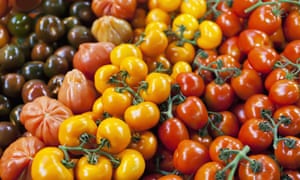
Demand for organic food is at its highest for more than a decade, according to major retailers.
That’s good news for an industry that was hit hard by the economic downturn but now seems to be returning to rude health as more shoppers say organic food is worth paying the premium for. This week the Soil Association will release its annual report on the state of the organic food market, which is expected to show that it has grown for the fourth consecutive year.
Meanwhile, Tesco says that organic sales in its stores have risen by 15% in the past year. And the home delivery service Ocado, which stocks more than 3,000 organic products, said sales increased 16% last year.
Waitrose also said the sector was thriving. “We were the first supermarket to sell organic products in the 1980s and shoppers are as enthusiastic as ever,” a spokeswoman said. “Our latest figures show year-on-year growth of around 5%.”
Significantly, sales of organic produce appear to be rising across all sectors, not just fruit and vegetables. An increasing number of consumers are buying organic fish, dairy produce and grocery items, such as olive oil, pasta and cooking sauces. But experts said price was still a major factor in switching to organic food, as promoted by celebrity chefs such as Jamie Oliver.
“We are seeing that shoppers are increasingly looking to buy organic food but it needs to be affordable and consistently high quality all year round for it to be considered a viable option,” said a spokeswoman for Tesco. “The popularity of organic food began with fruit and vegetables, but we are now seeing customers exploring areas such as grocery, fish and dairy. So you can now use organic produce for the whole meal.”
Adrian Blackshaw, chair of the Organic Trade Board, which recently won EU funding to help promote organic food in Britain and Denmark, said: “Traditionally the two main challenges for customers buying organic are the price and the availability. Over the past decade we have seen this improve across the industry and now the organic market is in a clear growth phase in the UK.”
Adam Wakeley, managing director of Organic Farm Foods, said: “The organic food revival is gathering pace thanks to retailers offering a wider range of quality foods at more affordable prices. They continue to support the organic sector and the result is continued growth, outstripping non-organic foods.”
Last year’s Organic Market Report from the Soil Association revealed that the sector was worth almost £2bn in 2015. Sales growth of organic produce outperformed the non-organic grocery market, which decreased by 0.9% in the same period. The association said independent retailers and home delivery box scheme companies had helped boost organic sales. Another key driver was the catering industry whose use of organic food grew by more than 15% last year.
“There is a clear opportunity for supermarkets to stock more organic, as our research showed people are having to shop around to find what they want,” said Clare McDermott, business development director at Soil Association Certification. “The discounters are upping their game and increasing their organic offer, as are other outlets such as Amazon Fresh. There is a huge and currently untapped potential to increase organic sales even further in supermarkets.”
No comments:
Post a Comment